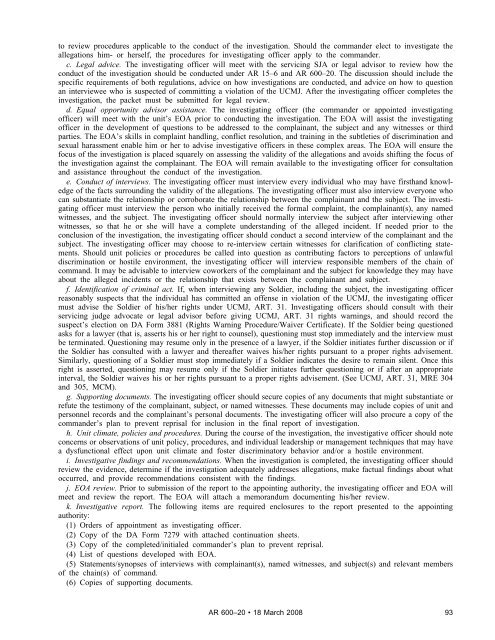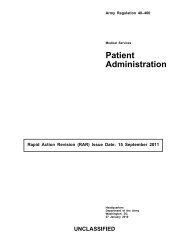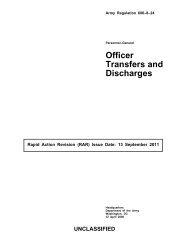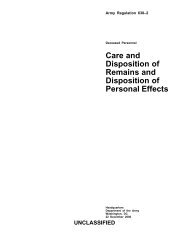AR 600-20, Army Command Policy - Army Publishing Directorate ...
AR 600-20, Army Command Policy - Army Publishing Directorate ...
AR 600-20, Army Command Policy - Army Publishing Directorate ...
You also want an ePaper? Increase the reach of your titles
YUMPU automatically turns print PDFs into web optimized ePapers that Google loves.
to review procedures applicable to the conduct of the investigation. Should the commander elect to investigate the<br />
allegations him- or herself, the procedures for investigating officer apply to the commander.<br />
c. Legal advice. The investigating officer will meet with the servicing SJA or legal advisor to review how the<br />
conduct of the investigation should be conducted under <strong>AR</strong> 15–6 and <strong>AR</strong> <strong>600</strong>–<strong>20</strong>. The discussion should include the<br />
specific requirements of both regulations, advice on how investigations are conducted, and advice on how to question<br />
an interviewee who is suspected of committing a violation of the UCMJ. After the investigating officer completes the<br />
investigation, the packet must be submitted for legal review.<br />
d. Equal opportunity advisor assistance. The investigating officer (the commander or appointed investigating<br />
officer) will meet with the unit’s EOA prior to conducting the investigation. The EOA will assist the investigating<br />
officer in the development of questions to be addressed to the complainant, the subject and any witnesses or third<br />
parties. The EOA’s skills in complaint handling, conflict resolution, and training in the subtleties of discrimination and<br />
sexual harassment enable him or her to advise investigative officers in these complex areas. The EOA will ensure the<br />
focus of the investigation is placed squarely on assessing the validity of the allegations and avoids shifting the focus of<br />
the investigation against the complainant. The EOA will remain available to the investigating officer for consultation<br />
and assistance throughout the conduct of the investigation.<br />
e. Conduct of interviews. The investigating officer must interview every individual who may have firsthand knowledge<br />
of the facts surrounding the validity of the allegations. The investigating officer must also interview everyone who<br />
can substantiate the relationship or corroborate the relationship between the complainant and the subject. The investigating<br />
officer must interview the person who initially received the formal complaint, the complainant(s), any named<br />
witnesses, and the subject. The investigating officer should normally interview the subject after interviewing other<br />
witnesses, so that he or she will have a complete understanding of the alleged incident. If needed prior to the<br />
conclusion of the investigation, the investigating officer should conduct a second interview of the complainant and the<br />
subject. The investigating officer may choose to re-interview certain witnesses for clarification of conflicting statements.<br />
Should unit policies or procedures be called into question as contributing factors to perceptions of unlawful<br />
discrimination or hostile environment, the investigating officer will interview responsible members of the chain of<br />
command. It may be advisable to interview coworkers of the complainant and the subject for knowledge they may have<br />
about the alleged incidents or the relationship that exists between the complainant and subject.<br />
f. Identification of criminal act. If, when interviewing any Soldier, including the subject, the investigating officer<br />
reasonably suspects that the individual has committed an offense in violation of the UCMJ, the investigating officer<br />
must advise the Soldier of his/her rights under UCMJ, <strong>AR</strong>T. 31. Investigating officers should consult with their<br />
servicing judge advocate or legal advisor before giving UCMJ, <strong>AR</strong>T. 31 rights warnings, and should record the<br />
suspect’s election on DA Form 3881 (Rights Warning Procedure/Waiver Certificate). If the Soldier being questioned<br />
asks for a lawyer (that is, asserts his or her right to counsel), questioning must stop immediately and the interview must<br />
be terminated. Questioning may resume only in the presence of a lawyer, if the Soldier initiates further discussion or if<br />
the Soldier has consulted with a lawyer and thereafter waives his/her rights pursuant to a proper rights advisement.<br />
Similarly, questioning of a Soldier must stop immediately if a Soldier indicates the desire to remain silent. Once this<br />
right is asserted, questioning may resume only if the Soldier initiates further questioning or if after an appropriate<br />
interval, the Soldier waives his or her rights pursuant to a proper rights advisement. (See UCMJ, <strong>AR</strong>T. 31, MRE 304<br />
and 305, MCM).<br />
g. Supporting documents. The investigating officer should secure copies of any documents that might substantiate or<br />
refute the testimony of the complainant, subject, or named witnesses. These documents may include copies of unit and<br />
personnel records and the complainant’s personal documents. The investigating officer will also procure a copy of the<br />
commander’s plan to prevent reprisal for inclusion in the final report of investigation.<br />
h. Unit climate, policies and procedures. During the course of the investigation, the investigative officer should note<br />
concerns or observations of unit policy, procedures, and individual leadership or management techniques that may have<br />
a dysfunctional effect upon unit climate and foster discriminatory behavior and/or a hostile environment.<br />
i. Investigative findings and recommendations. When the investigation is completed, the investigating officer should<br />
review the evidence, determine if the investigation adequately addresses allegations, make factual findings about what<br />
occurred, and provide recommendations consistent with the findings.<br />
j. EOA review. Prior to submission of the report to the appointing authority, the investigating officer and EOA will<br />
meet and review the report. The EOA will attach a memorandum documenting his/her review.<br />
k. Investigative report. The following items are required enclosures to the report presented to the appointing<br />
authority:<br />
(1) Orders of appointment as investigating officer.<br />
(2) Copy of the DA Form 7279 with attached continuation sheets.<br />
(3) Copy of the completed/initialed commander’s plan to prevent reprisal.<br />
(4) List of questions developed with EOA.<br />
(5) Statements/synopses of interviews with complainant(s), named witnesses, and subject(s) and relevant members<br />
of the chain(s) of command.<br />
(6) Copies of supporting documents.<br />
<strong>AR</strong> <strong>600</strong>–<strong>20</strong> 18 March <strong>20</strong>08<br />
93
















